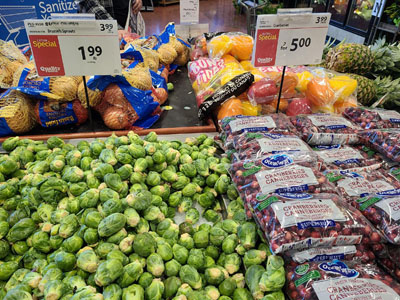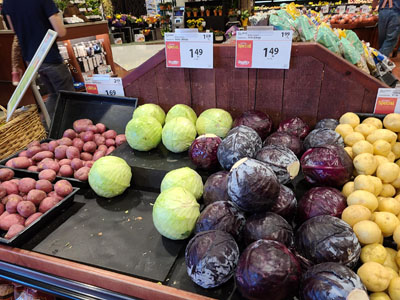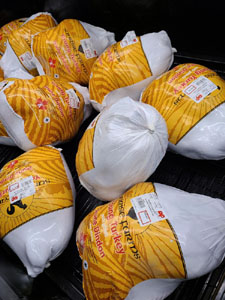
Sunday October 8,2023 | LANGFORD, BC
Economic editorial analysis by Mary P Brooke, B.Sc. | Island Social Trends
Shopping for groceries ahead of Thanksgiving dinner revealed a few bargains this weekend. Hopefully that is at least partly in response to federal government discussions with Canada’s five major grocers in recent weeks, from which evidence of competition in retail grocery prices was supposed to become evident.

This is anecdotal — one store, in one community — but here are some prices that were promoted as sales: potatoes $1.69/lb (reg $2.49), green cabbage $1.49/lb (reg $1.69), red cabbage $1.49/lb (reg $1.99), Brussels sprouts $1.99/lb (reg $3.99), bag of fresh cranberries 2 for $5 (reg $3.99), cooking onions $1.49/lb. Placed at the front of the store, it offered a sense of relief. Deeper into the store, much of everything else was priced the same as before.
Grocery prices have continued increasing at above the rate of overall inflation, for about 18 months. A full shopping cart for Thanksgiving that might have been $150 last year compares to this year just half-a-cart for $95.
Of course, when people eat less — or choose lower quality food options — they are generally at risk of experiencing reduced nutritional intake.
Overall cost of living struggles:
People continue to struggle with the basics of living — food, housing and just paying household bills. Canada has essential lost its middle class. Most people work just to make ends meet or make enough for a reasonable living but have nothing left over to save for any type of investment (e.g. home ownership or retirement).
Food bank usage is higher than ever in most Canadians towns and cities, in some cases doubling over the past year and a half that the Bank of Canada has been aggressively increasing their basic interest rate. In BC, the government keeps boosting food banks with funding (for equipment, transportation and facilities as well as purchasing food in bulk as donations from the community are down).
When the bank rate goes up, lending becomes more expensive for just about everything — notably for mortgage-holders and businesses with loans and lines of credit, but also for consumers who experience higher prices pushed up by inflation on nearly everything (due to input costs like fuel and transportation, which becomes included in the price of most products).
Canadian household debt has not only reached a new high but more consumers with non-mortgage debt (e.g. credit cards) are reaching their card limits and/or cannot pay down their cards as quickly as they could before (so the interest keeps building upon itself, not to mention additional over-charge fees and other ways to grind down the borrower).
40 years in the making:
How did Canada’s federal government remain asleep at the wheel on this for the last 40 or so years that this crisis as been building. Put simply, it was complacency. Though it’s more complex than that, with the underlying belief among the federal legislative elite that the system as it was — post-World War II and through the expansive 1980s and the fin-tech-emergent 1990s — would respond to natural market forces and keep everyone afloat. That was naive, inattentive, and yes, complacent.
Now we have a society where most people who might have considered themselves to be ‘middle class’ are now working class. Anyone without investment-related wealth or secure home ownership is working for a living, with monthly or even daily financial concerns.
The Bank of Canada’s steady hikes seems to align with their thinking from post-war strategies, but the dynamics of the economy have changed. There are strata of society that will simply not jump back on the bandwagon, remaining in the working class through no fault of their own. Also, the employment stats that seem to mystify the Bank of Canada need closer examination — they are seasonal, or part-time, or precarious (gig economy, no benefits), etc. A system that intentionally tinkers with the availability of employment is not suitable for the 21st century; everyone has a right to gainful and stable employment, with benefits. And most self-employed people still fall far outside the norms of financial stability and access to benefits.
That ‘older workers’ are no longer a shocking reality in the workforce should be a wakeup call for governments at all levels — people who are working past age 65 are in most cases doing so because of financial need. A new form of strain on Canadians who have worked hard all their lives and contributed to society through their taxes and commitments.
It’s a good sign that governments at all levels are now paying attention to increasing the supply of housing that is attainable and recognizing that many households need regular income boosts (about 11 million low-income Canadians receive regular quarterly support payments, blended with amounts from the provincial government in the case of BC). It’s the right direction, much too late, but there’s no time like the present to get started on trying to stabilize the economic future for Canadians.
===== RELATED:
- Thrifty Foods recalling Sunrise turkeys ahead of Thanksgiving (October 6, 2023)
- BC housing initiatives announced twice this week (September 29, 2023)
- Eby & Kahlon: tackling the ‘wicked’ housing challenge (September 18, 2023)
- Macklem: Rates will come down but we’re not there yet (September 7, 2023)
- Bank of Canada holds interest rate steady (September 6, 2023)
- Next Bank of Canada rate decision Sept 6 (September 4, 2023)
- BC tops up food bank funding by $15 million (August 24, 2023)
- Cost of living efforts: BC Hydro bill credit & BC Affordability Credit (November 18, 2022)
==== ABOUT ISLAND SOCIAL TRENDS:
Island Social Trends reports on ‘stuff that matters’ to you in your daily life, your household, your business and your community. News is posted daily at IslandSocialTrends.ca .
News is reported through a socioeconomic lens, including where any political or government impacts are relevant.
Island Social Trends Editor Mary P Brooke has a B.Sc. in foods and nutrition. She is interested in the health aspects of good food in today’s modern society, and gives talks on urban food resilience. See the Island Social Trends Food Security news section.
As an independent professional news outlet, Island Social Trends welcome support through ADVERTISING and PREMIUM ENEWS SUBSCRIPTIONS.









